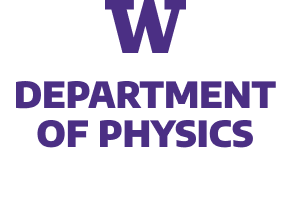Quantum computers hold great promise for arriving at exact simulations of nuclear dynamical processes (e.g., scattering and reactions) that are paramount to the study of nuclear matter at the limit of stability and to explaining the formation of chemical elements in stars. However, quantum simulations of the unitary (real) time dynamics of fermionic many-body systems require a currently prohibitive number of reliable and long-lived qubits. We propose a co-processing algorithm for the simulation of real-time dynamics in which the time evolution of the spatial coordinates is carried out on a classical processor, while the evolution of the spin degrees of freedom is carried out on a quantum processor. This hybrid algorithm is demonstrated in a quantum simulation of the scattering of two neutrons performed on the Lawrence Berkeley National Laboratory’s Advanced Quantum Testbed. We show that, after implementation of error mitigation strategies to improve the accuracy of the algorithm in addition to the use of either circuit compression techniques or tomography as methods to elucidate the onset of decoherence, this initial demonstration validates the principle of the proposed co-processing scheme. We anticipate that a generalization of this present scheme will open the way for (real-time) path integral simulations of nuclear scattering.
This work was supported in part by the U.S. Department of Energy, Office of Science, Office of Nuclear Physics, InQubator for Quantum Simulation (IQuS) under Award Number DOE (NP) Award DE-SC0020970 via the program on Quantum Horizons: QIS Research and Innovation for Nuclear Science. This work was prepared in part by LLNL under Contract No. DE-AC52-07NA27344 with support from the Laboratory Directed Research and Development Grant No. 19-DR- 005, and it was funded in part by the U.S. Department of Energy, Office of Science, Office of Nuclear Physics (under Work Proposal No. SCW1730), the Office of Advanced Scientific Computing Research Quantum Testbed Program (under Work Proposal No. FP00008338), and the Department of Energy National Nuclear Security Ad- ministration, Advanced Simulation and Computing Program.


